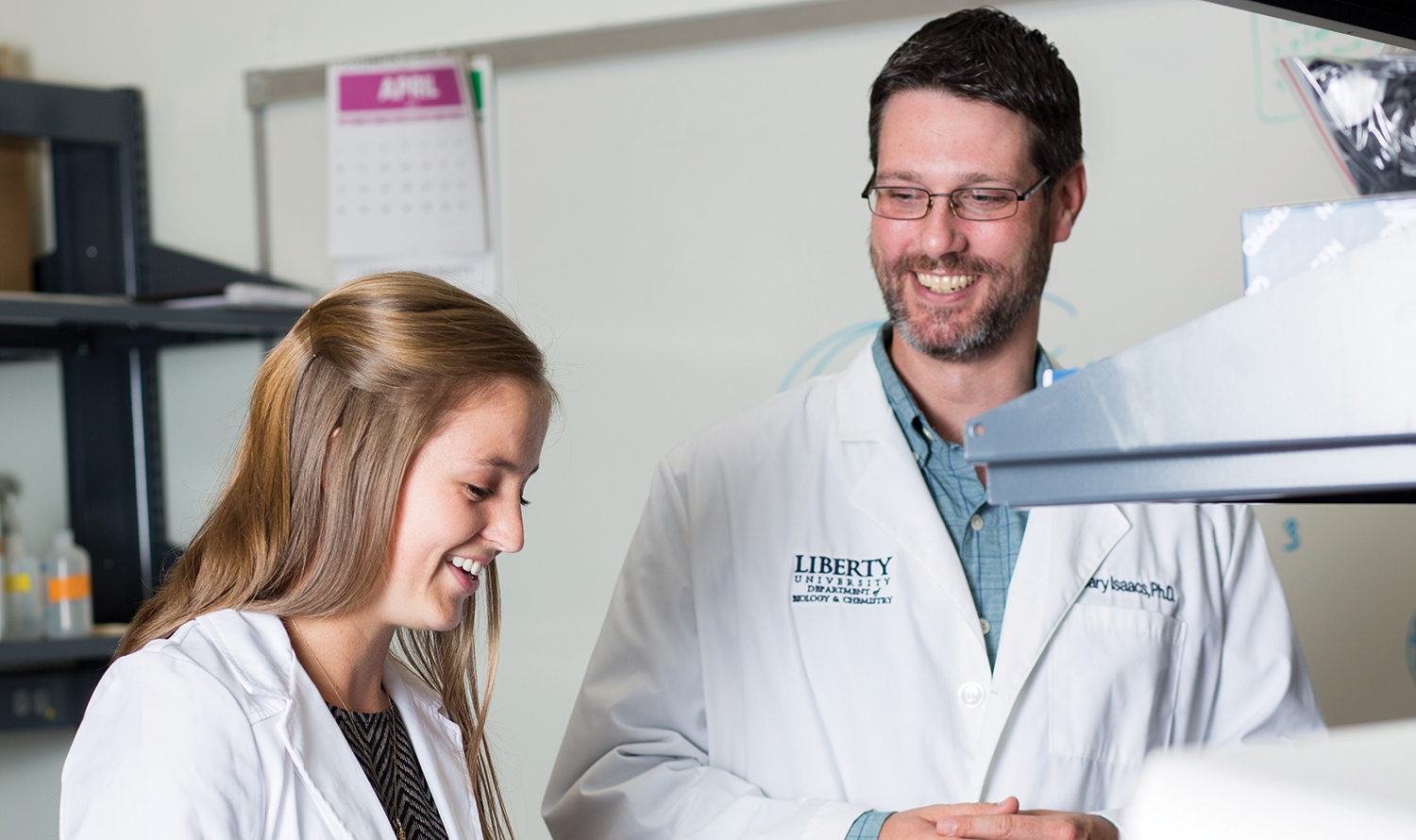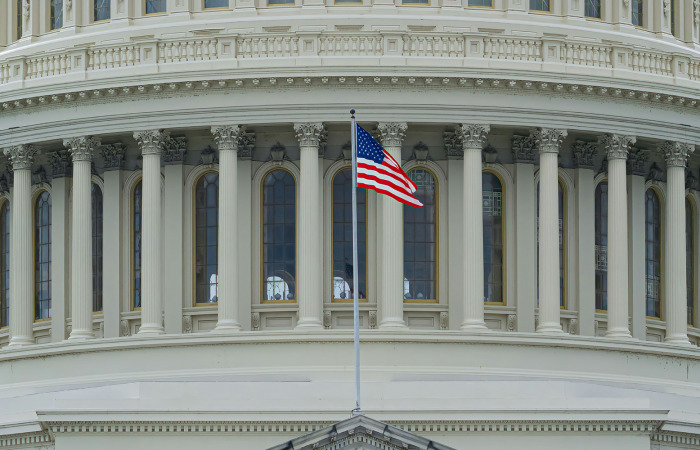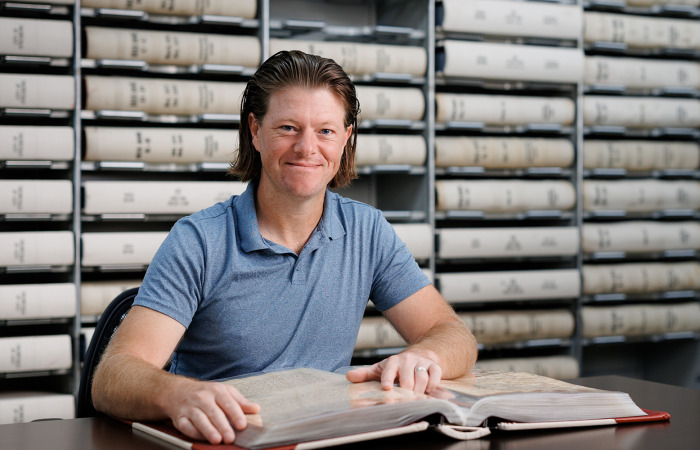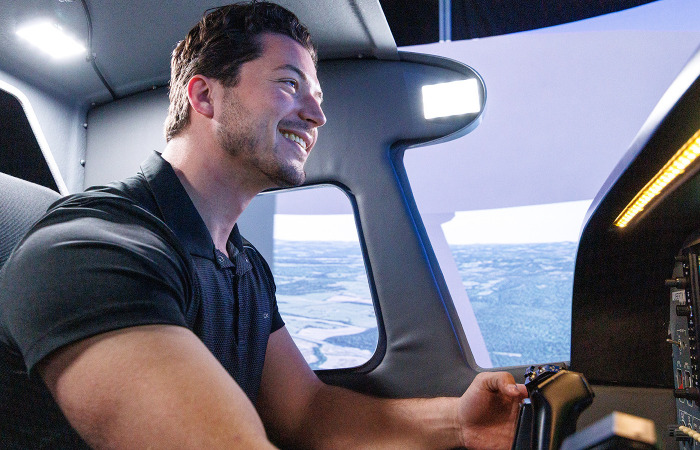Each story in this special feature section demonstrates a tenet of the “We The Champions” Declaration, part of a university-wide project that aims to tell the world how Liberty is fulfilling its mission of Training Champions for Christ.
We The Champions: Ignite a Passion for Wisdom
Demanding courses and faculty mentorship provide early preparation for graduate school
Liberty University’s mission of Training Champions for Christ fuels a tenacious drive in its faculty to ignite a passion for wisdom in their students — a passion that not only empowers them to achieve their educational and career goals, but also encourages them to work toward a higher purpose: improving the world around them.
“One of the hallmarks of a university is a commitment to expanding the universe of knowledge. For us, that is not just about adding something additional to the information possessed by a human being,” said Dr. Ronald Hawkins, Liberty’s provost and chief academic officer. “The expansion of knowledge is for the express purpose of playing a role in the extension of God’s shalom (peace) in the world. … And to always be mindful to utilize various resources and knowledge to make things better.”
This is evidenced by the unique educational culture found in Liberty’s undergraduate programs, where faculty at all course levels are developing mentor relationships and increasing hands-on learning and research opportunities for students outside the classroom.
“We want students to be curious. We want them to learn the value of inquiry, to test assumptions, to learn methods of research, and to be mentored by faculty,” said Hawkins. “There is such amazing design and complexity to God’s creation, and we want them to celebrate that.”
For this reason, Liberty’s undergraduate programs are exceeding expectations, preparing students for graduate education sooner than most.
Year after year, Liberty’s biology and chemistry programs demonstrate this dynamic as undergraduate students present research at the Virginia Academy of Science Annual Meeting alongside graduate students (from Liberty as well as other institutions). Their projects regularly take home awards, beating out graduate-level work.
Biomedical sciences is one of Liberty’s top undergraduate majors. Recent pre-med graduates have finished above the 90th percentile on the Medical College Admission Test (MCAT), with one student finishing in the 99.9th percentile.
This past summer, three undergraduate students in the Department of Biology & Chemistry helped conduct research that could prove the power of a popular super fruit, the acai berry, in battling multiple health problems. The ongoing research project is being funded by the National Institutes of Health (NIH) and led by Dr. Greg Raner. Using high-tech equipment and labs in Liberty’s Center for Natural Sciences, students are developing ways to measure activities that occur at the cellular level by breaking the berry down into different chemical compounds and then inserting them into human liver cells being grown in the university’s culture facility.
“The students are actually the hands in the lab,” Raner said. “It is their opportunity to experience firsthand the trials and successes of being a part of original laboratory research, working side-by-side with faculty. The students themselves provide direction and guidance throughout the process.”
He added that the investment in undergraduate research at Liberty is a “huge blessing to students because it shows them a side of science they are never going to see in the classroom.”
According to junior Noelle Addair, who worked on the project, “It’s a really unique experience, being able to use thousands of dollars of equipment as an undergrad student, because that’s not something a lot of other universities offer.”
Caroline Roberts, a senior in the biomedical sciences program, has been involved in an ongoing study on the genetic effects of folate on mice. She received a Provost’s Award for Research Excellence last spring. The award funds domestic and international research programs for students at the undergraduate and graduate levels.
“This study has given me an advantage as I apply to medical schools, many of which highly regard prior research experience,” she said. “Liberty’s biomedical sciences program is preparing me to stand out both as a medical school applicant and, hopefully, as a future physician.”
While Roberts expected to be challenged intellectually in college, she did not realize how much of an impact the university would have on her character, as well.
“I feel blessed because I have been dared to grow in so much more than head knowledge,” Roberts said. “Most importantly, my experience at Liberty has reinforced my desire to love God and people. This mindset will help me to practice medicine with compassion.”
Undergraduates like Roberts who plan to further advance their education are finding that they can already stand shoulder-to-shoulder with graduate students.
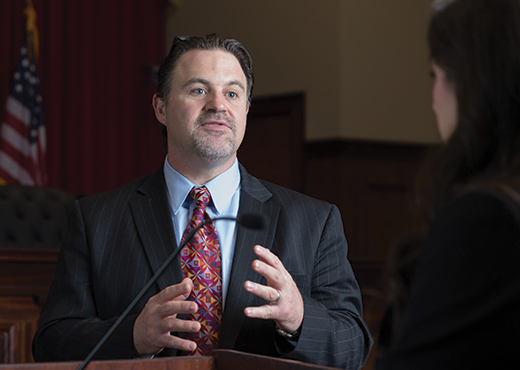
Attorney Tony Robertson is the program director for the Law & Policy: Pre-Law program in the Helms School of Government. (Photo by Kaitlyn Johnson)
In the Helms School of Government, the new Law & Policy: Pre-Law degree, launched this fall, is preparing students for their first — and most important — year of law school in unprecedented ways. Available both residentially and online, the pre-law program takes a unique and focused approach to law school preparation, exposing undergraduates to nuanced analytical skills and fundamental legal ideas from the start. Far from a traditional legal studies program, it requires core courses in legal reasoning and in the specific areas of the law, such as torts, contracts, civil procedure, and property — courses that serve as the foundation for law school and, eventually, the bar exam. The pre-law faculty is comprised of accomplished attorneys and, through an innovative partnership with Liberty University School of Law, three of the core courses are taught by Liberty Law professors.
“I don’t think there’s anything like it,” said Shawn Akers, dean of the Helms School of Government. “Liberty has had a long history of success with its pre-law program, but now we’ve taken it to an entirely new level. This program is strategically designed to deeply immerse students in the skills and knowledge they will need as they prepare for the LSAT (Law School Admission Test) and the all-important first year of law school. Our close partnership with Liberty’s outstanding law school makes it easier than ever for serious students to succeed in life, law school, and legal practice. From the first day of college to graduation from law school, Liberty is a great place to study law.”
Keith Faulkner, dean of Liberty Law, said the pre-law program is highly effective.
“The talented faculty and staff have done an amazing job in preparing Liberty students for law school. I can affirm that some of our strongest and most academically gifted law students studied at the Helms School of Government, and they are making an impact in law school classes, in externships and internships, and in practice. The sophisticated undergraduate curriculum provides a solid foundation for these young people to excel in the study of law at Liberty or at any other school.”
The rigor of Liberty’s undergraduate programs is also attracting new students to the Honors Program, which continues to add more National Merit students and finalists each year.
Doug Stephens IV entered Liberty as a National Merit Scholar in 2012 and continued to shine academically throughout his undergraduate studies in English. He was part of a three-time Big South Quiz Bowl Championship-winning team and competed in two national championship tournaments, in addition to being an honors student, a member of the Sigma Tau Delta English Honor Society, and a student consultant for Liberty’s Quality Enhancement Plan Committee, which plays a key role in Liberty’s regional accreditation.
“My honors courses were, without exception, challenging in new and often unexpected ways and forced me to expand my skill set in response,” Stephens said. “Furthermore, the experience of writing a senior honors thesis concluded my time at LU with a deeply researched and argued sample of scholarship that I was able to add to my (cover letter) — a true feather in my cap as I moved into graduate school.”
Stephens went on to earn an M.A. in English at James Madison University, and this semester started his juris doctor at Harvard Law School (HLS).
“The fact that I have been admitted to the Class of 2020 at HLS is testimony that I am as well prepared for the rigors of this program as any other student here,” he said. “It is irrefutable proof that a degree from Liberty allows students to perform at the highest levels with excellence.”
Faculty mentors teach, guide, and inspire
Liberty University professors ignite a passion for wisdom in their students by building valuable relationships with them as they join faculty in their research and share in special experiences outside the classroom that raise higher education to a whole new level.
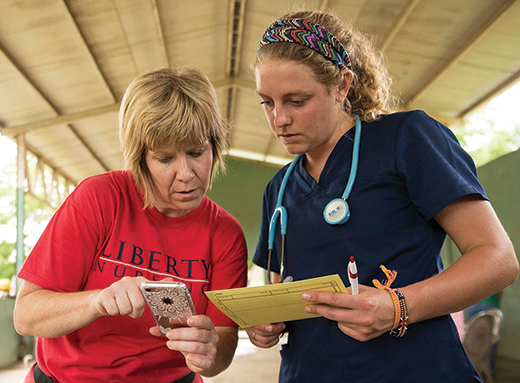
School of Nursing Associate Professor Dr. Kim Little and Liberty alumna Terrill Zentmeyer traveled to Guatemala in March to carry out research for Zentmeyer’s honors thesis. (Photo by Chris Breedlove)
When recent Liberty nursing graduate Terrill Zentmeyer (’17) first chose her student honors thesis, she had no idea she would travel to Central America with her faculty mentor to carry out her research. In June, Zentmeyer and School of Nursing Associate Professor Dr. Kim Little flew to Guatemala with a team of Liberty nursing students and student-doctors from Liberty University College of Osteopathic Medicine. The group was there to conduct health clinics in rural villages with Hope of Life International. Zentmeyer and Little also had the opportunity to work with 40 households from two different villages to study the residents’ iron intake and determine whether they were malnourished or not.
“In high school, I had gone on a medical missions trip,” Zentmeyer said. “Since then, it has been one of my dreams to continue doing that, and I felt that this research was the best way to combine my major and my passion.”
Little served as Zentmeyer’s faculty chair. “There is a need for young people like Terrill who have a love for service and want to help in third-world countries,” she said. “I am so glad to see that Liberty is Training Champions for Christ who want to be the hands and feet of Jesus.”
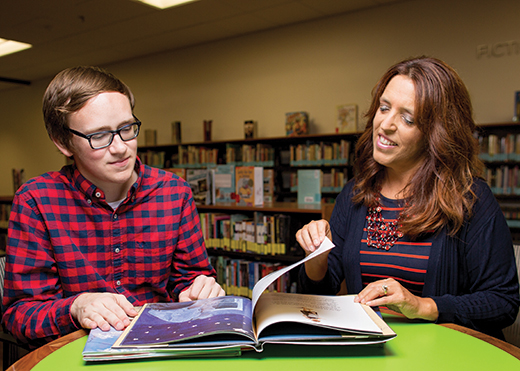
Senior Chandler Alder nominated education professor Dr. Kristina DeWitt for an award that recognizes faculty involvement and leadership. (Photo by Leah Seavers)
In the School of Education, one student felt so strongly about the impact his faculty mentor was making on his college career that he nominated her for an award.
For the last six years, School of Education Associate Professor Dr. Kristina DeWitt has been the faculty advisor for Liberty’s Pi Sigma Chapter, the undergraduate chapter of the Kappa Delta Pi (KDP) international honor society in education.
“For all her students, Dr. DeWitt’s door is always open,” said senior Chandler Alder, who worked with DeWitt as the chapter’s president. “She has offered so much support to the chapter, and it is clear that she cares about every one of her students. Dr. DeWitt has been like my second mom at college.”
He wanted to honor her in a special way, especially with the Spring 2017 semester marking her last one as faculty advisor. He nominated her for the 2016-17 KDP Southeast Regional Chapter Counselor Award, which recognizes advisors for modeling leadership, motivating and communicating with students, impacting the careers of chapter officers and members, involvement in chapter programs and activities, and exemplifying the mission and ideals of the society. He kept the nomination a secret until KDP notified DeWitt via email in July.
“I was in shock and in tears,” DeWitt said when she learned she had been chosen out of hundreds of applicants. “It means a lot that the nomination comes from your students.”
Alder said DeWitt has helped the chapter connect with school districts in the Lynchburg area, where they have been involved with students through events such as Literacy Alive Day, a campaign aimed at encouraging elementary students to read more.
DeWitt’s contribution to helping students prepare for their first teaching jobs also made a big impact on Alder.
“As I’m working on interviews, she has given me advice and suggestions about which schools to apply to for jobs that she feels would be a good fit,” Alder said. “She’s been so positive and encouraging to all of us.”
DeWitt will be formally honored at the society’s national convocation held in Pittsburgh, Pa., Oct. 26-28.
Biomedical Sciences students now have Doctor of Pharmacy option
Liberty University’s School of Health Sciences has created an accelerated pathway for students interested in pursuing a Doctor of Pharmacy (Pharm.D.). A recent partnership with the Appalachian College of Pharmacy (ACP), located in the Central Appalachian Mountains of Virginia, will allow students to complete a Pharm.D. in less time, with significant cost savings.
Through an articulation agreement between LU and ACP, a program that would normally take up to eight years to complete can now be done in six years. Students in Liberty’s biomedical sciences program who meet certain requirements can take three years of undergraduate coursework, then enter ACP.
Dr. Ralph Linstra, dean of the School of Health Sciences, said there continues to be a credential creep in health care as most professions require a graduate degree in the discipline for certification and licensure.
“When we can offer an accelerated pathway to acquire the necessary education and training, we are saving time and money for the student,” he said.
“ACP is excited to partner with Liberty University,” said Dr. Susan L. Mayhew, dean of ACP. “This is a unique opportunity that will allow students to increase their earning potential by one to two years. With entry-level pharmacist salaries starting around $110,000 per year, that’s a significant advantage. Aside from the financial incentives, the profession of pharmacy is rewarding on so many levels. There are more career paths and fields of specialization within pharmacy than ever before.”
ACP has one of the few accelerated three-year Doctor of Pharmacy programs in the nation and the only three-year program in Virginia. Its mission is unique among pharmacy schools, Mayhew said, distinguishing ACP as “a leader in the effort to educate pharmacists for service in medically underserved regions.”
ACP is accredited by the Accreditation Council for Pharmacy Education and by the Southern Association of Colleges and Schools Commission on Colleges (SACSCOC), Liberty’s regional accrediting body, to award the Doctor of Pharmacy degree.
It is anticipated that following the appropriate notification and approvals from accreditors, the Doctor of Pharmacy pathway will be offered to Liberty students beginning in Fall 2018.
“With this relationship with Appalachian College of Pharmacy, I expect a lot more student interest in pharmacy,” said Dr. David A. DeWitt, professor and chair of Liberty’s Department of Biology & Chemistry. “It really is a great opportunity for students.”
About 200 students are currently enrolled at ACP.
Liberty’s School of Health Sciences prepares students for careers in the natural sciences and health disciplines. Degree programs focus on physical, mental, and spiritual health, while encouraging students to grow in these disciplines with a Christian worldview.
To be involved in the “We The Champions” project and read more inspiring stories from the Liberty community, visit Liberty.edu/Champions and follow #WeTheChampions on social media.
